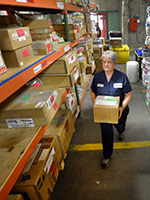All indicators show that the aviation industry is expected to grow marginally in upcoming years. The predicted boost in commercial flights will benefit aviation industry distributors; increased domestic trips by U.S. residents will result in higher demand for commercial aircraft repair and maintenance. As commercial flights increase, demand for aircraft parts will grow.
Introducing next-generation aircraft increases the demand for aircraft components compatible with the newest models. Moreover, new parts are increasingly being delivered by manufacturers themselves, thereby increasing the segment’s markets share as producers claim a larger share of the aftermarket. Declining used part and supply prices helps new parts gain a greater share of the industry’s revenue stream.
An airline’s reliability is largely dependent on the maintenance of its aircrafts and this in turn is decided based on turnaround time and lead time of aircraft parts procurement and repair. So, what’s available today to make it easier for the customer to get the aviation parts they need?
Parts Procurement
Aviation parts procurement is a collection of processes that involves many steps and interactions with other company departments and with suppliers. Traditionally, procurement was paper and conversation-based, and with procurement officers interacting with long-time partners or well-known suppliers, purchasing was done at fixed prices. This process then involved creating RFQs (request for quotations), purchase orders, order acknowledgment, shipping, invoicing, and other steps, which over a period of time were done via e-mail, fax and other forms of communication.
This form of procurement meant a smaller number of the suppliers and fewer parts available in the database. Moreover, the dependency on existing suppliers and inaccessibility to adequate parts pricing details occurred. These problems caused higher expenditures, and delays in aircraft maintenance and movement, thus hindering the airlines’ reliability.
All of this necessitated advanced aviation procurement technology. “The speed of technological development and its rapid pace has brought about new advancement and capabilities throughout the industry,” says Eric Strafel, president, Availl, A Boeing Co., DFW Airport, Texas. “Customers continue to see increased digital activity, web portals and other optimized channels that offer greater access to information, while also providing a faster and more seamless parts fulfillment process. Aviall expects this to continue and is constantly looking for ways to leverage improved technology and innovation to further increase connectivity and integration, data analysis and customer value management and optimization.”
Because of Aviall’s successful use of technology advancements, it aviation parts (including its best-in-class inventory) are more easily accessible for its customers.
